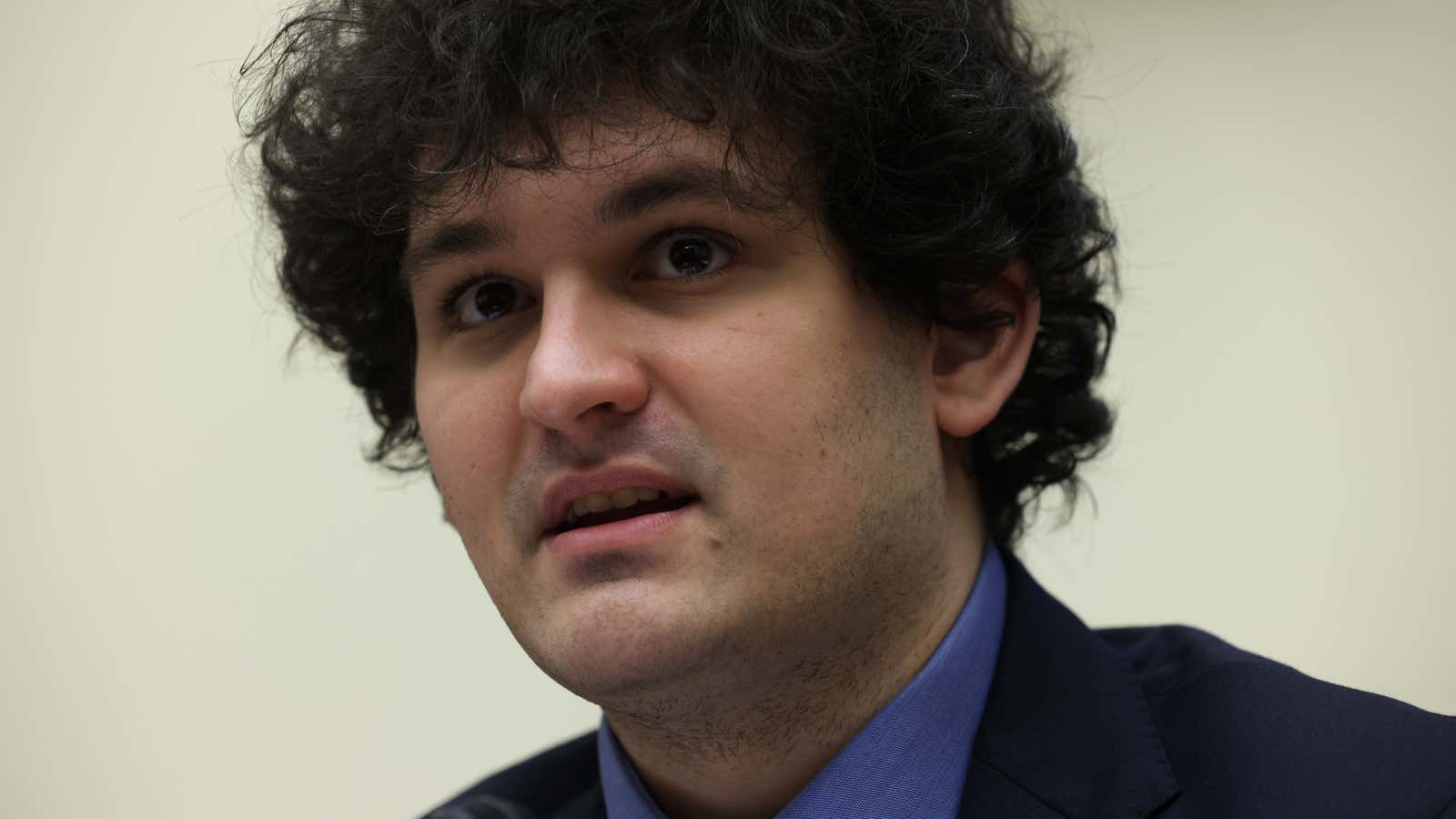FTX, one of the world’s largest cryptocurrency exchanges, imploded last week.
The company, once valued at $32 billion and bolstered by respected venture capital firms like Sequoia, allowed customers to buy and sell cryptocurrencies. A Rolodex full of A-list celebrities such as Tom Brady, Larry David, and Naomi Osaka hawked the company to retail investors. Forbes and Fortune put co-founder Sam Bankman-Fried on their covers, elevating the profile of the MIT graduate turned media darling with frizzy, unkempt hair and ill-fitting t-shirts.
Investors believed they could trust FTX to hold their money and place their investments. While crypto investments are volatile and risky, few were prepared for a major exchange to collapse. FTX wasn’t supposed to be the roulette table—it was supposed to be the casino whose chips were always good at the end of the night.
But on Nov. 10, FTX didn’t have enough money to cash everyone out as a rush of depositors tried to take out billions of dollars. A day later, on Nov. 11, the firm filed for bankruptcy in Delaware. The firm is now under multiple federal investigations for mismanaging customer deposits, and using them to make risky bets through its related Alameda Research hedge fund.
Though the fallout is not yet known, the blast radius from the collapse of FTX is sure to broaden. Quartz is tracking the major players caught up in the mess.
FTX’s customers
The brunt of the damage might be felt by FTX’s customers, whose funds are currently in limbo, if not gone forever. In a bankruptcy filing, FTX indicated that there are already 100,000 customer claims (pdf), a number that could surpass 1 million in time. And Reuters reports that at least $1 billion worth of customer funds is already missing.
Genesis
On Wednesday, Nov. 16, Genesis Global Capital, the lending arm of the crypto trading desk Genesis, announced it was halting withdrawals and new loans until further notice. The FTX collapse created “unprecedented market turmoil, resulting in abnormal withdrawal requests which have exceeded our current liquidity,” the company wrote in a tweet. Genesis previously lost hundreds of millions of dollars lending to Three Arrows Capital, an over-leveraged crypto hedge fund that shut down this year. Genesis is largely used by professional investors and other crypto firms.
Gemini
The crypto exchange Gemini, co-founded by the Winklevoss twins who made their fortune at Facebook, paused customer redemptions on its Gemini Earn crypto lending product after Genesis halted customer withdrawals this week. Gemini Earn is a high-yield product, in which customers earn interest on their deposits, which are lent out to other firms. But Bloomberg reports that Genesis was one of the primary borrowers of these funds. In a statement, Gemini wrote that Genesis is “doing everything in their power to fulfill their obligations to customers under the Earn program.”
As a result, Gemini suffered $485 million in withdrawals on Wednesday. Still, crypto wallets tied to the exchange have $1.7 billion in them, according to blockchain data platform Arkham Intelligence. (This may not be all of Gemini’s assets since Arkham doesn’t offer data from the Bitcoin blockchain). It also looks like traders have begun to either short or move out of Gemini’s dollar-pegged stablecoin GUSD on DeFi lending protocol Aave.
BlockFi
The crypto lender BlockFi was one of the companies that FTX agreed to save amid the recent crypto market downturn. In July, FTX gave BlockFi a $400 million revolving credit facility to help it stay afloat, negotiated alongside an option to buy the company. Now, BlockFi says it will lay off workers and file for bankruptcy.
Voyager Digital
The crypto lender Voyager Digital was also counting on FTX to save it, but now is “shocked, disgruntled, dismayed” to announce it will reopen the bidding process for a new buyer. Voyager accepted FTX’s $1.4 billion in September to acquire its assets. Now, CoinDesk is reporting that the US arm of Binance, an FTX rival, is preparing a bid for Voyager.
SkyBridge
Anthony Scaramucci’s investment firm, SkyBridge, had close ties to FTX. Not only did Bankman-Fried buy a 30% stake in SkyBridge through his FTX Ventures firm in September, but at the time SkyBridge also bought $10 million worth of FTT, the FTX native cryptocurrency that has lost 94% of its value in the past two weeks, according to data from CoinGecko. Scaramucci told Bloomberg this week that he did “a lot of due diligence” on FTX “but clearly not enough.”
“It’s very hard to protect yourself against that sort of misrepresentation,” he added
FTX’s Investors
FTX had 82 investors, according to the financial data company Pitchbook. That includes large venture capital funds and private equity investors like Sequoia Capital and Tiger Global, but also individual “angel” investors such as Shark Tank judge Kevin O’Leary, Tampa Bay Buccaneers quarterback Tom Brady, and model Gisele Bündchen. In bankruptcy proceedings, depositors will be paid out before investors, but it’s uncertain how much anyone will get from these proceedings.
Ontario Teachers’ Pension Plan
Perhaps the saddest revelation about the FTX debacle yet is that the Ontario Teachers Pension Fund has $95 million tied up in FTX. Luckily, the fund wrote in a statement that this “represents less than 0.05% of our total net assets.”
Nate DiCamillo contributed to this report.
